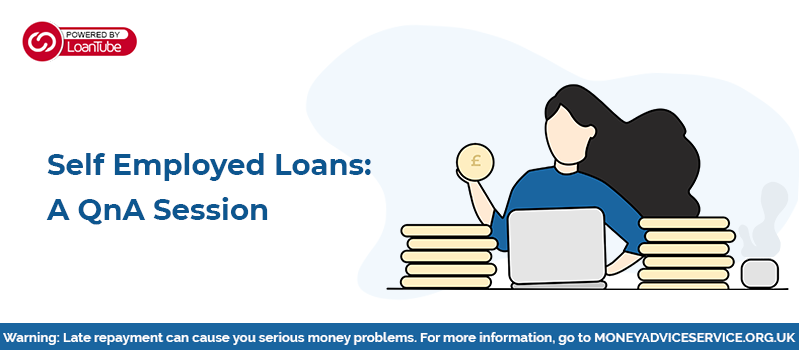COVID-19 has put the economy in, what feels like an infinite loop of financial turmoil. Nations all across are struggling to cope with this abrupt economic downturn. The UK government is encouraging banks to lend abundant loans. However, the root of the problem is, that not a lot of people can avail these loans. Moreover, lending institutions have tightened their lending criteria, which filters out a lot of people.
Getting a loan majorly depends on a borrower’s creditworthiness. But self-employed people, indeed, face a harder time getting approved for a loan. A lender would ideally want someone with a stable source of income, as opposed to someone with a fluctuating income. Now that lenders are stricter, it may become tougher. So how does one get a loan if they’re self-employed?
In this article, we will understand the loan options available for self-employed people.
Can I get a loan if I’m self-employed?
Yes, you can apply for a loan even if you’re self-employed. Although your options may be limited, you are likely to qualify for a loan with a good credit history, as long as you fulfill the lender’s criteria. Decent credit history and proof of income help the lender determine your creditworthiness and affordability. This can help you get loan offers with good terms – lower interest rates and longer tenure.
Many lenders lend money to freelancers and self-employed individuals looking to bridge some financial gaps. As long as you demonstrate responsible credit behavior, lenders may consider your application even if you’re self-employed.
What type of loans can I apply for?
Following are some loan options available to self-employed people in need of financial assistance:
Personal Loans: A personal loan is an unsecured loan, wherein you don’t need to use collateral against the loan. However, a personal loan is beneficial when you have a good credit history. A decent credit profile will help you get feasible loan terms, with an affordable interest rate.
Secured Loans: A secured loan is one where you use collateral to secure a loan. People often use their home equity as collateral to get a secured loan. So, if you fail to repay the loan, the lender can recoup their loss by selling your asset. Secured loans may come at a lower interest rate compared to unsecured loans. You can consider this option if you can’t present a substantial employment history or documented income.
Guarantor Loans: Getting a loan with an average or a below-average credit score can be difficult. Some lenders may approve your application if you present a guarantor, with a stellar credit profile. A guarantor is a close friend or family member, willing to co-sign a loan agreement with you. By doing this, they partake in the loan obligations along with you. Now, in case of a default, your guarantor will be held accountable for the loan’s repayments. Having a guarantor to cover you can increase your chances of getting approved for a loan. However, bear in mind that these loans tend to have higher rates of interest than typical personal loans.
Business Loans: A business loan can help you fund immediate expenses pertaining to your business. To secure a business loan, you’ll have to show your business accounts to the lender. Based on this, the lender will decide whether they wish to lend you money or not.
Will I have to pay more for a loan because I’m self-employed?
Lenders base a loan’s cost on your creditworthiness and affordability. As long as you can prove that you’ve been responsible with credit in the past and can afford to repay the money you’re planning to borrow, you’ll be offered standard rates. For this, however, good credit history is a prerequisite.
What information will a lender require?
Lending criteria can differ among different lenders. Following is a list of some common documents, required by most lenders:
Identity Proof: You can provide your driver’s license or passport as proof of identity.
Residence Proof: Your utility bills or council tax contains your address. So, use a copy of either of the two to use as residence proof.
Tax Returns (SA302): Self-employed people often self-file their tax returns. After filing your taxes, log into your HMRC account and download the SA302 for the last 2 years. This acts as proof of income that you declare as a part of your application.
Bank Statements: Bank statements help the lender validate the earnings reflected in your SA302. The lender will also be able to see a holistic picture of your financial standing, over a while.
Proof of rental income (if any): If you’ve let a property on rent, then you will need to declare the income that you’re earning out of it. This includes bank statements and mortgage documents. To provide evidence of tenancy, you’ll need to present a signed lease agreement.
Business information: Since you’re self-employed, the lender would be interested in knowing the nature and status of your business. You’ll also need to specify details if someone co-owns the business with you, with a financial interest in the business.
These data points are pivotal to your loan application. The lender will base their decision and determine the terms of your loan, based on this information. So it is important to ensure that this information is accurate. Missing out on any critical detail can gravely impact your application, hence, hampering your chances of getting the loan.
Conclusion
If you’re self-employed, chances are that you’ve faced a tough time getting a loan. Lenders often prefer borrowers with a valid proof of income, over a self-employed person, with variable income. While your options may be scanty, but it’s not impossible to get approval for a personal loan while being self-employed.
However, it is important to assess the pros and cons of the available options carefully. The end goal is to secure your finances, so compare the APRs of all your loan offers before shortlisting one.

